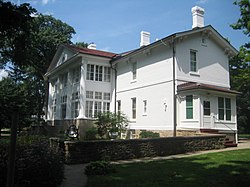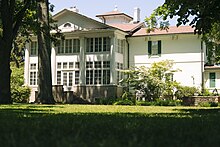This article has multiple issues. Please help
improve it or discuss these issues on the
talk page. (
Learn how and when to remove these template messages)
|
The Dillon Home | |
 The back of the Dillon Home | |
| Location | Sterling, Illinois |
|---|---|
| Built | 1857 |
| Architectural style | Italianate |
| NRHP reference No. | 80001417 |
| Added to NRHP | October 9, 1980 |
The Paul W. Dillon Home, often referred to as the Dillon Home, is located in Sterling, Illinois. It was home to businessman P.W. Dillon, who was the president of Northwestern Steel & Wire Company for many of its most successful years. The home was added to the National Register of Historic Places on October 9, 1980.
History
While the land itself had dozens of owners, once built, the home with the land had seven owners with only six residing within its walls. The Victorian home less its East wing, was constructed in 1858 and is cast in the Italianate style. The home was eventually purchased by Washington M. Dillon, and ultimately conveyed to his son, P.W., following his death.
In 1904, P.W. married Lucretia (Crete) Blackman Dillon, of Dixon. The couple raised their three children in P.W.'s boyhood home. To accommodate their growing family, P.W. replaced the existing small, open porch on the south with a much larger enclosed two-story porch. The northeast porch was also enclosed. Since then, the only major structural change has been the installation of an elevator in 1972. The home's grandeur is a remarkable sight, as P.W.'s wife Crete, was an avid traveler, and collector of eclectic pieces and period furniture.
P.W. and Crete lived in the home for 50 years when Crete died in 1970. Ten years later, P.W. died in the same home where he was born. Unique from most historic home museums, The Dillon Home retains all of the original furnishings and belongings, since the home and land was conveyed to the Sterling Park District after PW.’s passing in 1980.
The home opened to the public as a museum on November 18, 1980. The following year, Baldwin Steam Engine #73 was retired and moved to the south lawn along with a tender and caboose. Until its retirement, the engine was operational at Northwestern Steel & Wire, and was the last working steam engine in the United States used in an industrial application.

External links
- Sterling Park District: Dillon Home Museum
- Sterling-Rock Falls Historical Society
- Potpourri: Illinois Parks and Recreation 12 May/June 1981
- National Register of Historic Places: Whiteside County, Illinois

- National Register of Historic Places in Whiteside County, Illinois
- Historic house museums in Illinois
- Museums in Whiteside County, Illinois
- Houses completed in 1857
- Museums established in 1980
- 1980 establishments in Illinois
- Houses on the National Register of Historic Places in Illinois
- Italianate architecture in Illinois
- Houses in Whiteside County, Illinois
This article has multiple issues. Please help
improve it or discuss these issues on the
talk page. (
Learn how and when to remove these template messages)
|
The Dillon Home | |
 The back of the Dillon Home | |
| Location | Sterling, Illinois |
|---|---|
| Built | 1857 |
| Architectural style | Italianate |
| NRHP reference No. | 80001417 |
| Added to NRHP | October 9, 1980 |
The Paul W. Dillon Home, often referred to as the Dillon Home, is located in Sterling, Illinois. It was home to businessman P.W. Dillon, who was the president of Northwestern Steel & Wire Company for many of its most successful years. The home was added to the National Register of Historic Places on October 9, 1980.
History
While the land itself had dozens of owners, once built, the home with the land had seven owners with only six residing within its walls. The Victorian home less its East wing, was constructed in 1858 and is cast in the Italianate style. The home was eventually purchased by Washington M. Dillon, and ultimately conveyed to his son, P.W., following his death.
In 1904, P.W. married Lucretia (Crete) Blackman Dillon, of Dixon. The couple raised their three children in P.W.'s boyhood home. To accommodate their growing family, P.W. replaced the existing small, open porch on the south with a much larger enclosed two-story porch. The northeast porch was also enclosed. Since then, the only major structural change has been the installation of an elevator in 1972. The home's grandeur is a remarkable sight, as P.W.'s wife Crete, was an avid traveler, and collector of eclectic pieces and period furniture.
P.W. and Crete lived in the home for 50 years when Crete died in 1970. Ten years later, P.W. died in the same home where he was born. Unique from most historic home museums, The Dillon Home retains all of the original furnishings and belongings, since the home and land was conveyed to the Sterling Park District after PW.’s passing in 1980.
The home opened to the public as a museum on November 18, 1980. The following year, Baldwin Steam Engine #73 was retired and moved to the south lawn along with a tender and caboose. Until its retirement, the engine was operational at Northwestern Steel & Wire, and was the last working steam engine in the United States used in an industrial application.

External links
- Sterling Park District: Dillon Home Museum
- Sterling-Rock Falls Historical Society
- Potpourri: Illinois Parks and Recreation 12 May/June 1981
- National Register of Historic Places: Whiteside County, Illinois

- National Register of Historic Places in Whiteside County, Illinois
- Historic house museums in Illinois
- Museums in Whiteside County, Illinois
- Houses completed in 1857
- Museums established in 1980
- 1980 establishments in Illinois
- Houses on the National Register of Historic Places in Illinois
- Italianate architecture in Illinois
- Houses in Whiteside County, Illinois